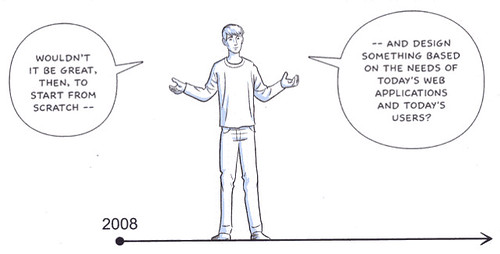There is an article in the NY Times a few weeks ago called “Brave New World of Digital Intimacy” and i think it’s one of the best pieces i’ve read in a long time at explaining why Facebook Status, News Feed, Twitter and other new digital platforms are useful and popular.

The online area that the article talks about is “incessant online contact” or as some call it, “ambient awareness.” In the offline world people pick up on moods by little things like body language, sighs, little comments, etc.. In the online world this is being done by microblogging tools like Twitter (140 character updates), Dopplr (where are you traveling?), Tumblr (what web items do you like), and Facebook’s Status Feed. The article asks the question that i get asked all the time, Who cares?:
For many people — particularly anyone over the age of 30 — the idea of describing your
blow-by-blow activities in such detail is absurd. Why would you subject your friends to your daily minutiae? And conversely, how much of their trivia can you absorb? The growth of ambient intimacy can seem like modern narcissism taken to a new, supermetabolic extreme — the ultimate expression of a generation of celebrity-addled youths who believe their every utterance is fascinating and ought to be shared with the world.
This is indeed how many people view it. But the genius of the article is how it explains the subtle usefulness of the information:
Each day, Haley logged on to his account, and his friends’ updates would appear as a long page of one- or two-line notes. The updates were indeed pretty banal. One friend would post about starting to feel sick; one posted random thoughts like “I really hate it when people clip their nails on the bus”; another Twittered whenever she made a sandwich — and she made a sandwich every day. Each so-called tweet was so brief as to be virtually meaningless.
But as the days went by, something changed. Haley discovered that he was beginning to sense the rhythms of his friends’ lives in a way he never had before. When one friend got sick with a virulent fever, he could tell by her Twitter updates when she was getting worse and the instant she finally turned the corner. He could see when friends were heading into hellish days at work or when they’d scored a big success. Even the daily catalog of sandwiches became oddly mesmerizing, a sort of metronomic click that he grew accustomed to seeing pop up in the middle of each day.
This is the paradox of ambient awareness. Each little update — each individual bit of social information — is insignificant on its own, even supremely mundane. But taken together, over time, the little snippets coalesce into a surprisingly sophisticated portrait of your friends’ and family members’ lives, like thousands of dots making a pointillist painting. This was never before possible, because in the real world, no friend would bother to call you up and detail the sandwiches she was eating. The ambient information becomes like “a type of E.S.P.,” as Haley described it to me, an invisible dimension floating over everyday life.
This is exactly how it works. Now, i don’t have ESP through this but i do enjoy the knowledge of how my friends’ lives are progressing. These tools have enabled that to happen and it has certainly enhanced my relationships with them.
![Reblog this post [with Zemanta]](http://img.zemanta.com/reblog_e.png?x-id=666138e0-eb72-4248-a8d7-3d48ac9b10af)


![Reblog this post [with Zemanta]](http://img.zemanta.com/reblog_e.png?x-id=7bb68b0f-d270-4f70-a504-62912f91c944)

![Reblog this post [with Zemanta]](http://img.zemanta.com/reblog_e.png?x-id=96452e70-07bd-4e44-87c8-f1e630f9582c)



 Last week a reporter (Robert Lanham, author of “The Hipster Handbook”) published “
Last week a reporter (Robert Lanham, author of “The Hipster Handbook”) published “



